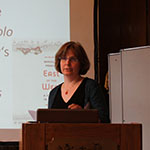Euroacademia Conferences
 Europe Inside-Out: Europe and Europeanness Exposed to Plural Observers (9th Edition) April 24 - 25, 2020
Europe Inside-Out: Europe and Europeanness Exposed to Plural Observers (9th Edition) April 24 - 25, 2020 Identities and Identifications: Politicized Uses of Collective Identities (9th Edition) June 12 - 13, 2020
Identities and Identifications: Politicized Uses of Collective Identities (9th Edition) June 12 - 13, 2020 8th Forum of Critical Studies: Asking Big Questions Again January 24 - 25, 2020
8th Forum of Critical Studies: Asking Big Questions Again January 24 - 25, 2020 Re-Inventing Eastern Europe (7th Edition) December 13 - 14, 2019
Re-Inventing Eastern Europe (7th Edition) December 13 - 14, 2019 The European Union and the Politicization of Europe (8th Edition) October 25 - 26, 2019
The European Union and the Politicization of Europe (8th Edition) October 25 - 26, 2019 Identities and Identifications: Politicized Uses of Collective Identities (8th Edition) June 28 - 29, 2019
Identities and Identifications: Politicized Uses of Collective Identities (8th Edition) June 28 - 29, 2019 The European Union and the Politicization of Europe (7th Edition) January 25 - 26, 2019
The European Union and the Politicization of Europe (7th Edition) January 25 - 26, 2019 7th Forum of Critical Studies: Asking Big Questions Again November 23 - 24, 2018
7th Forum of Critical Studies: Asking Big Questions Again November 23 - 24, 2018 Europe Inside-Out: Europe and Europeanness Exposed to Plural Observers (8th Edition) September 28 - 30, 2018
Europe Inside-Out: Europe and Europeanness Exposed to Plural Observers (8th Edition) September 28 - 30, 2018 Identities and Identifications: Politicized Uses of Collective Identities (7th Edition) June 14 - 15, 2018
Identities and Identifications: Politicized Uses of Collective Identities (7th Edition) June 14 - 15, 2018
“I would be nothing without you”: Survival and Failure in Rana Dasgupta’s Solo and Miroslav Penkov’s East of the West
-
-

-
Presentation speakers
- Anja Müller, Siegen University, Germany
- Download presentation
Abstract:
For Margaret Atwood, survival is the central image of Canadian Literature and the victim its central character. According to Peter Carey, Australian literature is suspicious of success but embraces failure and loss as constitutive elements. Rana Dasgupta’s novel Solo, winner of the Commonwealth Writers’ Prize in 2010, and Miroslav Penkov’s story collection East of the West inscribe Bulgaria into a post-colonial context echoing Atwood and Carey, as they make failure and survival central concerns of their Bulgarian characters. I am going to explore how the two texts develop the notions of failure and survival not only to represent their Bulgarian protagonists or to come to terms with Bulgaria’s past, but also to unfold the buoyant energy and creativity of their characters. I shall argue that, although the narratives address key themes of post-colonial literature or literature of migration, such as home, displacement, memory or return, their characters share some peculiarities that add new turns to these issues. Penkov’s stories and Dasgupta’s novel take a critical stance towards identification via ethnicity, nation or gender; nevertheless they do not resolve essentialist assumptions with transcultural identities or nomadism. Instead, Solo and East of the West celebrate the human individual and his or her potential for survival. Accentuating the choices the characters make and whose consequences they bear despite their failures, the narratives are profoundly ethical. With this strong emphasis on ethical individualism, the two texts confront stereotypical representations which define Eastern Europe through its Communist past, where the collective was favoured over the individual, as well as an equally stereotypical notion of the chaotically diverse Balkans. Moreover, they represent ambiguous positions towards history and memory with homesick characters emphasising their blood bonds while insisting on breaking with their past (Penkov) or by juxtaposing the memory of a human being and its country with daydreams that only give a dim hint at ‘what furies and passions […] and raw human energies are emerging out of the ruins of the collapsed Soviet Empire’ (http://www.guardian.co.uk/books/booksblog/2009/sep/07/not-booker-solo-rana-dasgupta <2 March 2012>) (Dasgupta).
-
Related Presentations


















